
Abstract
The importance of free access to essential legal information is outlined, particularly in relation to the development of the rule of law in Asian countries, and to the development of the legal systems of those countries through Internet access to comparative law materials. The main features of the new Hong Kong Legal Information Institute (HKLII) are described. HKLII may be the first 'legal information institute' (LII) in Asia: a free, independent, and non-profit Internet facility providing relatively comprehensive coverage of the essential legal information of a jurisdiction (Hong Kong). The development of HKLII has been made possible by the policies of the HKSAR government and judiciary supporting access to legal information. These policies, it is argued, provide better support for the rule of law than those found in some other Asian jurisdictions. HKLII is a partner in the development of the World Legal Information Institute (WorldLII), which is attempting to encourage and assist the development of global free access to essential legal information. The scope and facilities of WorldLII are described briefly. The combination of a local LII like HKLII and the facilities of WorldLII gives a model for systematic global legal research over free access Internet materials.
At least in relation to 'essential' legal information, free access to the laws of one's own country is an important support for the rule of law. By 'essential legal information' we mean primary legal materials (legislation, case-law, treaties etc) and some secondary materials (interpretative) legal materials (law reform reports, travaux préparatoires, investigative commission reports etc). The test is something like 'legal information produced by public bodies which have a duty to produce it and to make it public'.
There are also good reasons to value having free access to other jurisdictions' laws and to value people from other countries having free access to ours. Developing countries have a major need for access to law in other jurisdictions, so as to be able to undertake their own law reform based on comparative research. This is impossible without free access to the world's 'best practice' laws via the Internet, because government lawyers in developing countries cannot afford access to almost any commercial forms of foreign law materials, and the maintenance of law libraries of foreign law materials is financially impossible[1]. Attraction to foreign investment is enhanced by free access to information about the operation of a country's legal system. Transparency of a country's legal system is one of the three legal and administrative requirements for WTO membership., and this is enhanced by free access to at least regulatory materials. To achieve these global benefits requires an international quid pro quo: although people in other countries obtain a 'free ride' on access to the laws of my country (on systems funded in my country), I obtain free access to the laws of many other countries.
Taking a global perspective, it would be desirable if two conditions were satisfied:
We use the term 'Legal information Institute' (LII) to refer to a provider of legal information that is independent of government, and provides free access on a non-profit basis to multiple sources of essential legal information[4]. Ideally, a LII should attempt to provide comprehensive coverage of at least the most important sources of essential legal information for the jurisdictions that it covers.
Examples of LIIs include Cornell's Legal Information Institute (LII - 1994) for US federal law, the Australasian Legal Information Institute (AustLII 1995) for Australian law, the British and Irish Legal Information Institute (BAILII 2000) for the jurisdictions of the UK and Ireland; the Canadian Legal Information Institute (CanLII - 2000) for Canadian law; and the Pacific Islands Legal Information Institute (PacLII - 2001) for ten countries of the Pacific. These are now joined by the Hong Kong Legal Information Institute (HLIII - 2002).
Throughout the world there are many free Internet sources of case law[5], legislation[6] and other essential legal information, but seven years after the creation of the first LIIs it is still only a minority of jurisdictions around the world that have accepted the need to provide comprehensive free access to essential legal information, either through creation of government sites, or by providing the data to independent free access publishers.
Throughout Asia there has as yet been only limited progress in the provision of systematic access to essential legal information. In some jurisdictions there is now access to comprehensive sets of legislation (eg Singapore, Japan), and isolated Courts have made their decisions freely accessible (eg the Supreme Courts in Korea and India). However, there have been no examples of attempts to create systematic access to the essential legal information of a jurisdiction. In the worst case, government agencies and Courts are still being tempted to regard the provision of legislation or Court decisions as a revenue-generating opportunity, limiting access to the law to those with the capacity to pay high access fees.
1 Provision in a completed form (including additional information best provided at source)
2 Provision in an authoritative form (examples are court-designated citations and digital signatures)
3 Provision in the form best facilitating dissemination
4 Provision on a marginal-cost-recovery basis to anyone
5 Provision with no re-use restrictions or licence fees (subject to preserving integrity)
6 Preservation of a copy in the care of the public authority
7 Non-discriminatory recognition (end the privileged status of 'official' reports )
A corollary of these propositions is that it is not sufficient for official bodies only to publish essential legal information for free access on their own web sites. Provision to other publishers (whether LIIs or commercial publishers) is also necessary for sound public policy, and is more important than official self-publication. Such dissemination is necessary to ensure that free-access is not second-rate access.
The government and Judiciary of the Hong Kong SAR satisfy most of these criteria to a high degree, with matters concerning Court-designated citations yet to be addressed. The most explicit illustration of these policies (other than the existence of HKLII) is the 'Yes you may copy and link ...' policy on the BLIS web site[8] which states in part in relation to the whole of the Hong Kong Ordinances and other legislation:
1.It is the policy of the Government of the Hong Kong Special Administrative Region[HKSAR] that the electronic publications of the laws of Hong Kong should be freely available to all persons. 2.Visitors to this web site are permitted to a.download, print, make copies of and distribute HKSAR legislation on this site, and b.include the HKSAR legislation in a text book or other educational materials, whether in electronic or paper form.Overall, the HKSAR satisfies these seven criteria more than any other jurisdiction in Asia and more than most jurisdictions in the world.

Relationships between free and fee, essential and editorial
Where essential legal information is not available to free access publishers, that is an indication of poor public policy, in terms of the criteria outlined above.
Where free access publishers provide access to some of the information also published by commercial publishers (eg legislation, case law) lawyers and others who can afford commercial legal publications ('wealthy lawyers') benefit from the competitive pressure on commercial publishers. As a result, they are more likely to provide some financial assistance to free access.
The development of HKLII was and is possible because Hong Kong, of all jurisdictions in Asia, already has both public policies supporting free access to legal information, and a number of official Internet sites providing some of that information in a systematic and sophisticated form. It has therefore been possible to build on these developments in Hong Kong to create one comprehensive, independent source of free access to essential Hong Kong legal information.
The main motivations for the creation of HKLII are:

Extract from HKLII home page <http://www.hklii.org/>
At present only English language versions are provided on HKLII, but Chinese language versions of some data (including Ordinances and some case law) will be provided later. The Chinese language versions will initially be browsable only, not searchable.
The system is described as a demonstration system at present, because we are still developing the continuous updating arrangements. We have released it for use now as it is already useful.
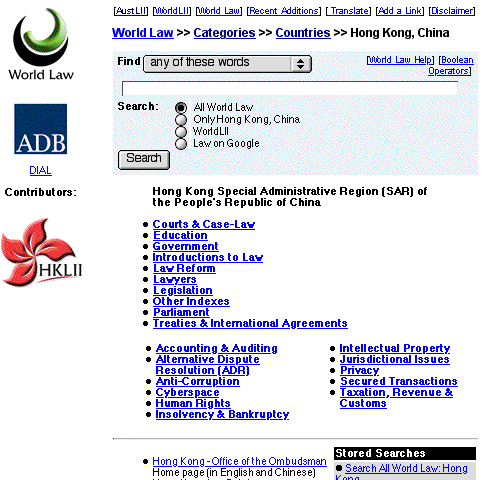
Main page for Hong Kong in the World Law catalog (extract)
Other World Law pages associated with HKLII are the pages for the jurisdictions China, Macau SAR, and Taiwan, and the subjects WTO and Human Rights. Other subjects are being added.
All HKLII databases may be searched simultaneously, and may also be searched in groupings ('All case law', 'All legislation' etc) or by each individual database. Customised selections of individual databases may also be made. The example below show a selection of three collections of case law, plus practice directions.
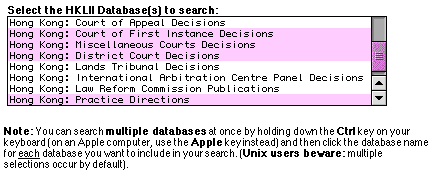
HKLII full search screen (extract) showing only some of the search options
In default, searches are over the whole of HKLII, and the results are ranked in order of likely relevance to the search query. The example search results below (a search for 'arbitration near (appeal or review)') show in the first six items retrieved a section of an Ordinance, a Practice Direction, and decisions from three different Courts. The effectiveness of the relevance ranking is indicated by the titles of the first two items retrieved.
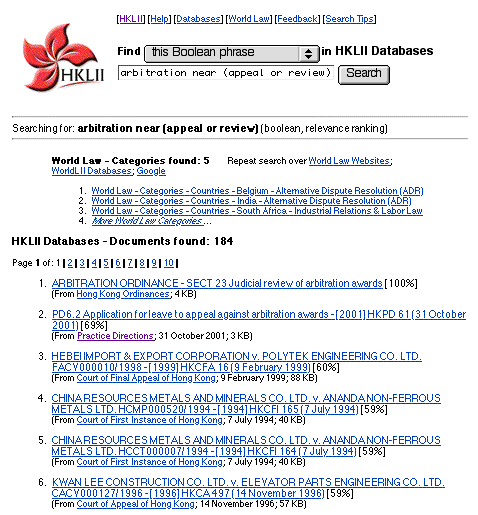
Example of HKLII search results (extract)
HKLII nevertheless adds value to this information by providing different ways of accessing it. Some examples of the additional functionality of HKLII are as follows:
The relationship between HKLII and the 'official' sites of legal information in Hong Kong is as it should be: each provides forms of value-adding to the underlying legal information that the technology chosen to implement each makes possible, and they each stimulate the other to improve the quality of the services they provide.
The relationship between HKLII and the commercial publishers of Hong Kong legal information is twofold. HKLII does not attempt to provide the forms of value-adding that can only be provided by extensive editorial input, such as headnotes on cases, legislative annotations, and expert commentary. However, by providing such value-adding as can be provided by automated means, HKLII may stimulate commercial publishers to re-examine their own services.
The name 'WorldLII' was used to describe the challenge of developing a global free access legal research facility at a meeting of parties interested in free legal information at the LII Workshop on Emerging Global Public Legal Information Standards[11] held at Cornell in July 2000. Various possible models were discussed at the Cornell workshop, the most detailed of which was a distributed search system described by Tom Bruce[12]. This implementation of WorldLII does not rely as much on distributed searches as Bruce's model.

Collaborating parties banner from the WorldLII front page
Databases accessible through WorldLII are located at the following sites:
Australasian Legal Information Institute (AustLII) - <http://www.austlii.edu.au/> British and Irish Legal Information Institute (BAILII) - <http://www.bailii.org/> Canadian Legal Information Institute (CanLII) - <http://www.canlii.org/> Hong Kong Legal Information Institute (HKLII) - <http://www.hklii.org/> Pacific Islands Legal Information Institute (PacLII) - <http://www.paclii.org/> WorldLII (including databases provided by Wits Law School, South Africa)
At the time of writing, the first version of WorldLII has existed for only a few weeks, so this description of its features is relatively brief.
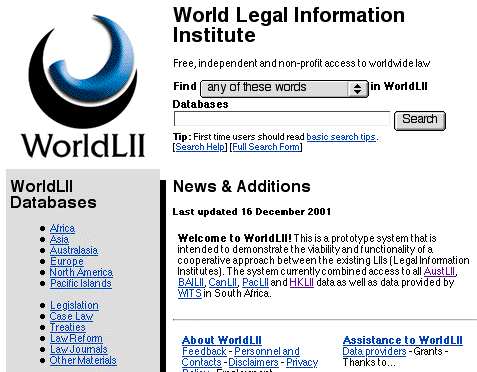
WorldLII front page (extract) - looks familiar?
WorldLII has been designed with an appearance and functionality similar to the other LIIs collaborating in its operation, to assist user recognition and ease of use. What does the logo mean? Well, it is vaguely world-shape ...
We intend that, subject to limitations of resources, we will include in WorldLII significant databases made available to us by Courts, Law Reform Commissions, and the like from jurisdictions where there is currently no national or regional LII that can act as a host.
However, the most valuable search feature of WorldLII will often be that it allows narrower searches over particular types of materials, but across a wide range of jurisdictions. This is illustrated by the range of selections already provided.

An extract from the WorldLII search options (Full Search Form)
The following search options have been implemented:
Geographically-based search options will become particularly interesting when WorldLII expands to include databases from more than one LII or other source in a region. The geographical options provided at present include (with current content listed):
Finally, users may choose their own combinations of the over 200 databases accessible from WorldLII: 'customised' searches. It may also be valuable to provide for users a selection of the most obviously valuable subject- specific customisations, such as 'All administrative review Tribunals' or 'All unfair competition tribunals' or 'All anti-discrimination tribunals'.
In WorldLII and its collaborating LIIs, cross-national hypertext links are only implemented to a limited extent as yet. For example, on WorldLII and BAILII in the database 'England and Wales Court of Appeal (Civil Division) Decisions', the decision Yasin Sepet And Erdem Bulbul V. Secretary Of State For Home Department (Unhcr Intervening) [2001] EWCA Civ 681 <http://www.bailii.org/ew/cases/EWCA/Civ/2001/681.html> contains two automated hypertext links to Australian High Court decisions on WorldLII (and AustLII), as shown in the following extract (at para 88).

Extract from a UK court decision with automated hypertext links to Australian cases
This example also shows a UK court citing an Australian decision by its Court-designated 'HCA' citation, rather than a publisher-designated citation. Because AustLII and BAILII identify all cases by their Court-designated citations, these links can be created automatically between and within national collections on WorldLII.
Where Courts cite cases by use of publisher-designated citation, the task of recognising the location of cases on WorldLII from the citation is much more difficult and is a major research task for the future development of WorldLII and for national LIIs.
This systematic approach to legal research is implemented in two different ways in WorldLII and its collaborating LIIs: (i) invitations in search results to repeat searches over different collections; and (ii) the World Law interface which provides search options of different scope over different collections. They are outlined below. Other implementations of a systematic approach will no doubt be implemented as WorldLII develops.
Where a user starts research from a single LII (eg HKLII), search
results will appear headed by a message such as the following:
World Law - Categories found: 2 Repeat search over WorldLII Databases ; World Law Websites
Similarly, anyone who commences research on World Law is invited to repeat their search over WorldLII (represented by the lighter lines in the diagram below), and both the WorldLII and World Law searches invite a further search over Google.
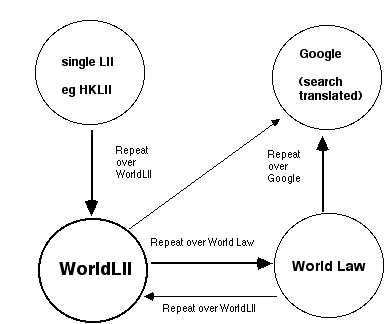
A systematic research path, starting from a single LII (in bold)
How can this be achieved through one reasonably transparent interface? We propose to implement it through the World Law interface, as shown below for the 'Legislation' page of the World Law catalog. The fourth option 'Only WorldLII Legislation' is additional to the options available now.
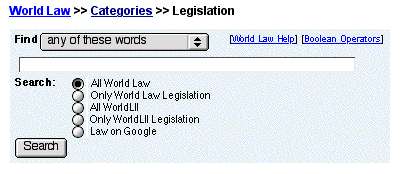
Proposed World Law search interface on the Legislation page
When this is implemented fully in World Law, the user's context in browsing the catalog (eg 'Legislation') will determine the scope of the second and fourth options offered. So, for example, if the user is at the World Law page for all 'Law Reform' then the available options will include 'Only World Law - Law Reform' and 'Only WorldLII Law Reform'.
[AustLII 2000a] 'Scalability of Web Resources for Law: AustLII's Technical Roadmap: Past, Present and Future', 2000 (1) The Journal of Information, Law and Technology (JILT) <http://www.law.warwick.ac.uk/jilt/00-1/austin.html> (Austin, D, Mowbray A and Chung, P)
[AustLII 2000b] 'A Defence of Plain HTML for Law: AustLII's Approach to Standards', 2000 (1)The Journal of Information, Law and Technology (JILT) <http://www.law.warwick.ac.uk/jilt/00-1/chung.html> (Chung, P, Mowbray A and Austin, D)
[AustLII 2000c] Solving the Problems of Finding Law on the Web: World Law and DIAL', 2000 (1) The Journal of Information, Law and Technology (JILT) <http://www.law.warwick.ac.uk/jilt/00-1/greenleaf.html> (Greenleaf G, Austin D, Chung P, Mowbray A, Matthews J and Davis M)
[AustLII 2000d] 'Free the Law: How the Australasian Legal Information Institute (AustLII) Achieved the Free Availability of Legal Information on the Internet' 2000 (1). The Journal of Information, Law and Technology (JILT).<http://www.law.warwick.ac.uk/jilt/00-1/transcript.html> (Greenleaf G)
[AustLII 2001a] 'Philosophy, Practice and Future of the Australasian Legal Information Institute (AustLII): Achieving the free availability of legal information on the Internet' (Transcript) Joint Symposium 2001 - Social Roles of Legal Information Database, Meiji University, Tokyo, Japan, 19 May 200; published in SHIP Project Review 2001, Meiji University, Japan; slides only at <http://www2.austlii.edu.au/~graham/Slides/Tokyo2001/>; transcript will be available at <http://www2.austlii.edu.au/~graham/>
[AustLII 2001b] 'World Law: Finding law after Google' (Graham Greenleaf, Philip Chung and Russell Allen) Proc. AustLII Law via Internet 2001 Conference, AustLII, Sydney, 2001; will be available at <http://www2.austlii.edu.au/~graham/>
[CanLII 2001a] Daniel Poulin 'CanLII 2000-2004 - a Canadian Model for a LII ' Proc. AustLII Law via Internet 2001 Conference, AustLII, Sydney, 2001
[CanLII 2001b] Ernst Perpignand and Daniel Poulin 'CanLII 2000-2004 - Technical Strategy' Proc. AustLII Law via Internet 2001 Conference, AustLII, Sydney, 2001
[**] Philip Chung is Lecturer in Law, University of Technology, Sydney, and Executive Director, AustLII; philip@austlii.edu.au
[***] Andrew Mowbray is Associate Professor and Associate Dean of the Faculty of Law, University of Technology, Sydney, and Co-Director, AustLII; andrew@austlii.edu.au
[2] See AustLII 2000b and AustLII 2001c for an explanation of this approach.
[3] ibid
[4] We are not suggesting that LIIs should only provide essential legal information. They are likely to be involved in the provision of other types of secondary materials such as law journals, in the provision of 'plain English' guides to the law and in other approaches to improving public access to the law. These matters require different considerations from what is discussed in this paper.
[5] See <http://www.austlii.edu.au/links/2172.html> for a global list
[6] See <http://www.austlii.edu.au/links/2027.html> for a global list
[7] See [AustLII 1997], [AustLII 2000d] and [AustLII 2001a] for more discussion.
[8] See <http://www.justice.gov.hk/index.htm#>
[9] ibid
[10] This has not been implemented fully on HKLII at the time of writing, due to the need to modify mark-up scripts to deal with Ordinances. On the AustLII system, there are over 30M such within-system links.
[11] See <http://barratry.law.cornell.edu/Summit/index.htm>
[12] Tom Bruce 'WORLDLII: A sketch for a distributed search system' <http://barratry.law.cornell.edu/Summit/worldlii.htm>
[13] See [AustLII 2001b] for a detailed description.
[14]
ibid